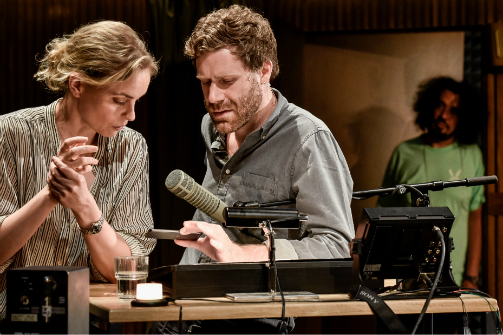
Returning to Reims
By Schaubühne Berlin; Directed by Thomas Ostermeier
Off Broadway, Play
Runs through 2.25.18
St. Ann's Warehouse, 45 Water Street
by Ran Xia on 2.14.18
 Nina Hoss, Bush Moukarzel, and Ali Gadema in Returning to Reims. Photo by Arno Declair.
Nina Hoss, Bush Moukarzel, and Ali Gadema in Returning to Reims. Photo by Arno Declair.
BOTTOM LINE: Schaubühne Berlin's latest work is a poignant theatrical conversation that is at once personal and multilayered.
The actress Katy (Nina Hoss) enters a recording studio just after the men go for a detour to the canteen. The film director Paul (Bush Moukarzel) and Tony, the engineer (Ali Gadema), have been chattering behind the glass partitions even as the audience steps into the space. Katy waits patiently with an air of dignified confusion, readying herself in preparation. She’s about to record voiceover for a documentary about French philosopher Didier Eribon when a voice booms—“I am thy father’s ghost”—giving her a fright. Katy’s recently passed father, along with the complex relationship between Eribon and his own father, thus becomes the Chekhovian gun that’s suspended in the room from the very beginning.
The session begins, and we hear Katy’s gentle voice accompany footage from the Eibon documentary, in which we see the Parisian intellectual return home to Reims, but not until after his father’s funeral, which he refused to attend. Gradually we uncover the author’s upbringing in his Communist family, his rift with his father that stems from his homosexuality, and his reconciliation with his past. “I was a class traitor,” Eribon says. He further elaborates the relationship as well as discontinuity between his sexuality and his social background: there he was, a kid out of housing projects, reinventing himself in the arts, while his brother was perfectly content with becoming a butcher.
The film, combined with Katy’s voiceover, is a poetic visual memoir. Some say that you can never return home, because even if nothing has changed, you have different eyes, so it’s a different world altogether. I think of my own experience returning home: time and again there’s a disharmony between expectation and realization. When memories no longer hurt as much, it’s also the beginning of the worst kind of loss. So as images of train tracks and rapidly changing scenery move across the screen, the look in Eribon’s eyes is a familiar one: a combination of ache (from all the loss) and relief.
The film shifts as we transition from Eribon’s personal experience to political commentary on the European leftists’ failure in embracing the working class. The director Paul suggests that it's a "multilayered" film, and indeed it makes the theatrical production multilayered as well. Hoss’s Katy becomes the embodiment of sober criticism as she points out the director’s flaw in omitting certain perspectives from Eribon’s book.
Although a thoughtful, inspiring, and socially relevant piece that will surely generate debate amongst a new generation of politically woke, intellectually stimulated theatre aficionados, I fear Returning to Reims is less accessible to anyone who is not well versed on the subject. The highly complex issue of WWII-era European politics, as well as Katy’s voiceover—a commentary essay adapted from the book—are both saturated with information, and could be hard to digest without having done homework on the aforementioned issues.
Even with the show’s criticisms of the flawed political movements of the radical left (which are on par with Eribon’s point of view), it does end on a hopeful note, as we see the tangible result of compassion. Returning to Reims is not your typical political drama—its unique quietness in style becomes a powerful tool for underscoring the disquietude of the issues it addresses. You won’t necessarily leave the theatre satisfied by a story of intrigue, but you’ll bring home more questions than you could have possibly imagined two hours ago. And isn’t that the point of theatre?
(Returning to Reims plays at St. Ann's Warehouse, 45 Water Street in Brooklyn, through February 25, 2018. The running time is 2 hours with no intermission. Performances are Tuesdays through Saturdays at 8; and Sundays at 2. Tickets are $50 and are available at stannswarehouse.org or by calling 718-254-8779.)
Returning to Reims is by Schaubühne Berlin, based on a memoir of the same name by Didier Eribon. Directed by Thomas Ostermeier. Set and Costumes by Nina Wetzel. Associate Set Designer is Doreen Back. Lighting Design by Erich Schneider. Sound Design by Jochen Jezussek. Music by Nils Ostendorf. Dramaturgs are Florian Borchmeyer and Maja Zade.
The cast is Nina Hoss, Bush Moukarzel, and Ali Gadema.

